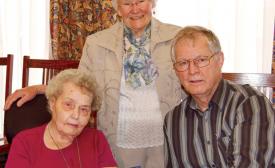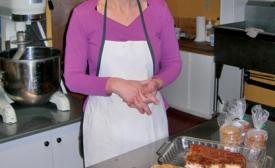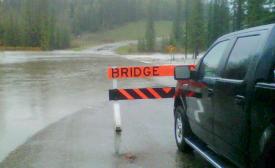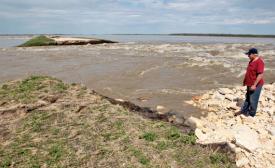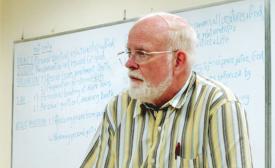Volume 15, Number 12
Political dialogue 101 for Mennonites
Cooking for peace
“Will the fellows like my cooking?” wondered Nettie Redekopp in 1954 as she arrived at the Pax post-World War II rebuilding project in Wedel, Germany. That question haunted her for years, but finally in 2010 she dredged up the courage and began to call those whose phone numbers she could find.
New Hamburg Mennonite Relief Sale goes ‘green’
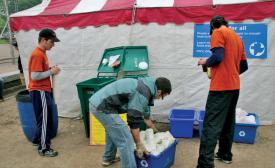
Tyler Yantzi, centre, moves compostable paper bowls from a blue box into the green bins as volunteers Scott Bauman, left, and Mark Brubacher, right, look on.
One of the stated goals of Mennonite Central Committee (MCC) is creation care, to the point of MCC Ontario hiring Darren Kropf part-time to spearhead this effort in congregations. But activities like the New Hamburg Mennonite Relief Sale, now having completed 45 years, are run by grassroots organizations and are not part of MCC proper.
Baking is a privilege
Lynette Froese is reluctant to call her unique career a business, or even a career. “I was raised to consider work as a form of service, so I try to see this work not just as a business, but as a way of offering a service,” she says.
Readers comment
- You are doing a wonderful job at this point of time. I see you change ideas as times change. Good!
- Have the confidence that you are aware that endeavours like this can remain static.
- Would it be possible to print and mail from Saskatoon for Saskatchewan readers. By the time we get a copy, much is old news.
The survey says . . .
Despite a small survey sample—only 215 out of more than 14,000 subscribers took the time to send back the two-page questionnaire in our Feb. 21 issue—it is clear that readers still believe Canadian Mennonite “should be a primary source of information about Mennonite Church Canada”; 89 percent agree or strongly agree with this sentiment.
Evacuation
Slave Lake burns while Valaqua road is flooded
In the past month, wildfires in northern Alberta devastated the community of Slave Lake, with the resulting losses coming to the attention of both Mennonite Mutual Insurance (MMI) and Mennonite Disaster Service (MDS), while in the south the swelling Little Red Deer River cut off access to Camp Valaqua from the north.
Paying the price to keep Winnipeg dry
While Winnipeggers remained dry and free from the worry of flooding this spring, this is not the case for farmers living near the Portage Diversion, including Tony and Astrid Peters and their family. Up to 75 percent of the Peters’ 405-hectare potato farm is engulfed by water.
Speaking with one voice
Participants at the International Ecumenical Peace Convocation (IEPC)—held last month in Kingston, Jamaica, to celebrate the end of the Decade to Overcome Violence—released a message expressing their unified experience of a week-long exploration of a just peace and ways to navigate a path forward as they return to their homes and churches around the world.
A different sort of challenge
A few months ago our four-year-old daughter was overheard singing a song with only one line, which she repeated irritatingly till my patient wife didn’t know whether to laugh or cry. Our little fireball of estrogen was singing a song of her own creation ripe with ironic truth: “I’m a different sort of challenge.” Amen, little sister.
An uncomfortable place to be
Readers write
In search of a ‘relational’ theologian
Thank you very much for your editorial, “Habits of Repair,” May 2, page 2.
For discussion
Divorce ministry resources
- Becoming a National Church by Adolf Ens. CMU Press, Winnipeg, Man., 2004.
- Between Two Worlds: The Inner Lives of Children of Divorce by Elizabeth Marquardt. Three Rivers Press, New York, N.Y., 2005.
- The Children of Divorce: The Loss of Family as the Loss of Being by Andrew Root. Baker Academic, Grand Rapids, Mich., 2010.




